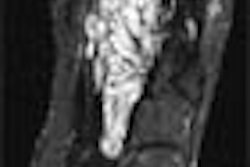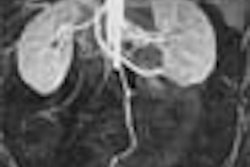French researchers used functional MRI (fMRI) to depict the connection between neural networks' functioning during mental tasks and their associated rewards -- but the relationship wasn't exactly what the scientists had expected.
Neurology researcher Dr. Richard Levy and his colleagues at Hôpital de la Salpetriere in Paris enlisted six healthy volunteers to undergo a 45-minute study that measured their brain activation patterns. A 3-tesla MRI system (Bruker Medical, Billerica, MA) was used for this research. The study was presented at the 2002 American Academy of Neurology meeting in Denver.
The subjects were placed on their backs in the MRI, looking at a monitor above them. Their response to the "n-back" mental performance tests, which gauge executive processes, were recorded. The subjects stood to take home $285 if they performed well in the tests.
Levy said the aim of the study was to visualize the areas of the brain that were enhanced on the fMRI scan during the task. He said he had expected to see enhancement in the prefrontal cortex, which is involved in cognitive aspects of behavior such as working memory, and in the ventral medial prefrontal cortex associated with reward sensitivity and motivation.
"We were surprised to find that there was a decreased activity in the reward sensitivity area," he said. Instead, they found that in order to perform the more difficult tasks "the brain actually appears to shut down the reward area. In addition to rewards, that area is also involved in anxiety."
The researchers said that in order to achieve success in mental performance tests, anxiety has to be muted. Levy said previous work has shown that people who are depressed have activated ventral medial prefrontal cortex areas, apparently an anxiety manifestation that makes it more difficult for depressed individuals to perform mental tasks well.
Dr. Gerald Novak, a researcher with Johnson & Johnson Pharmaceuticals in Raritan, NJ, commented that this kind of fMRI information could someday help identify targets for pharmaceuticals in his specialty area of pediatric neurology.
"This study is very interesting, but I think it requires additional work to determine exactly what is going on," Novak said. "Sometimes when things don't work out the way you expect them to, there is a tendency to develop additional theories."
Levy said his group had begun recruiting patients with depression for the second phase of the research, but that patient recruitment is a slow process. Gathering together even six people for the current study took three years, mainly because his hospital’s ethics panel had to be convinced that offering sizable sums of money to participants was warranted.
"We thought that in order to show this network in true form, the subjects had to realize that there was, in fact, real money at stake," Levy said.
By Edward SusmanAuntMinnie.com contributing writer
May 8, 2002
Related Reading
Prefrontal cortical activity and dopaminergic function linked in schizophrenia, February 4, 2002
Brain scan separates lies from truth, November 16, 2001
New fMRI studies show learning and judging in action, November 15, 2001
Copyright © 2002 AuntMinnie.com



.fFmgij6Hin.png?auto=compress%2Cformat&fit=crop&h=100&q=70&w=100)




.fFmgij6Hin.png?auto=compress%2Cformat&fit=crop&h=167&q=70&w=250)











